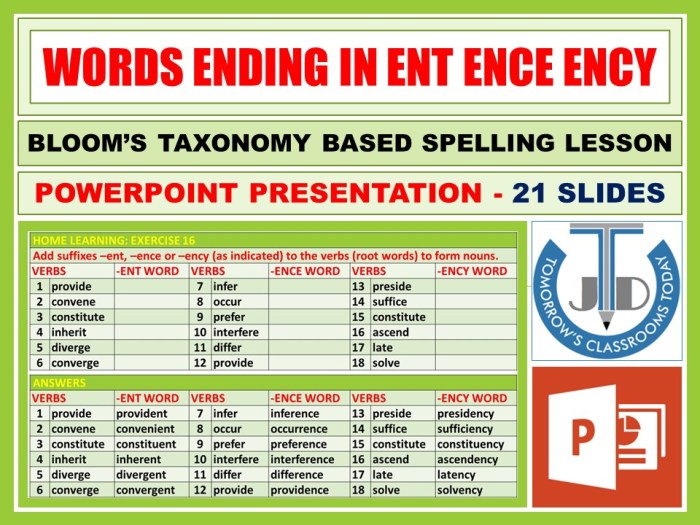Words that end in ance or ence – Words that end in “ance” or “ence” dance upon the pages, revealing nuances of meaning and captivating the reader’s imagination. From “abundance” to “essence,” these words paint a vibrant tapestry of concepts, inviting us to delve into their linguistic and literary depths.
This comprehensive exploration will illuminate the patterns, origins, and usage of words that end in “ance” or “ence,” unveiling their semantic relationships and stylistic significance.
Common Patterns and Structures: Words That End In Ance Or Ence
Words that end in “ance” and “ence” often share common root words and grammatical functions. The following table provides examples of these words, their root words, parts of speech, and definitions:
| Word | Root Word | Part of Speech | Definition |
|---|---|---|---|
| Abundance | Abund | Noun | A large quantity of something |
| Absence | Absent | Noun | The state of being away or not present |
| Assistance | Assist | Noun | Help or support |
| Existence | Exist | Noun | The state of being |
| Importance | Important | Noun | The quality of being significant or valuable |
| Persistence | Persist | Noun | The quality of continuing to exist or do something despite difficulty or opposition |
| Preference | Prefer | Noun | A liking for or a choice of one thing over another |
| Presence | Present | Noun | The state of being in a particular place or situation |
As can be seen from the table, many words that end in “ance” and “ence” are derived from Latin verbs and nouns. These words often have a nominal function, meaning they refer to abstract concepts, states, or qualities. Additionally, these words often have a sense of importance or significance, indicating a notable or essential aspect of something.
Etymological Origins

Words ending in “ance” and “ence” have a rich and diverse etymological history, drawing influences from various languages and cultures throughout time. These suffixes often indicate a state, quality, or action and have been borrowed and adapted into English from different sources.
Latin and French Influences
Many words ending in “ance” and “ence” have Latin roots. The suffix “-ance” derives from the Latin suffix “-antia,” which signifies a state or quality, as in “elegance” and “abundance.” Similarly, the suffix “-ence” originates from the Latin suffix “-entia,” indicating an action or process, as in “science” and “patience.”These
suffixes were adopted into French, where they underwent further modifications. Words like “dance” and “chance” were borrowed from French, retaining their “ance” endings.
Other Language Influences
Beyond Latin and French, words ending in “ance” and “ence” have also been borrowed from other languages. For example, the word “finance” originates from the Old French term “finer,” meaning “to pay,” which in turn derives from the Latin word “finis” (end).Similarly,
the word “romance” has its roots in the Old French word “romanz,” derived from the Latin “romanice,” referring to the vernacular language spoken in medieval France.
Examples of Borrowed Words
Numerous words ending in “ance” and “ence” have been borrowed into English from various languages, enriching the vocabulary of the language. Here are a few examples:
- Alliance (French)
- Audience (Latin)
- Competence (Latin)
- Essence (Latin)
- Patience (Latin)
- Resistance (Latin)
- Vigilance (Latin)
Semantic Relationships

Words ending in “ance” and “ence” share certain semantic relationships. They often convey ideas of action, state, or quality.
These words can have similar meanings, such as “assistance” and “aid,” or opposite meanings, such as “acceptance” and “rejection.”
Words with Similar Meanings
- Assistance and aid
- Guidance and direction
- Importance and significance
Words with Opposite Meanings
- Acceptance and rejection
- Presence and absence
- Persistence and transience
Usage and Distribution

Words ending in “-ance” and “-ence” are commonly used in various contexts, both written and spoken. Their frequency and prevalence vary depending on the genre and style of communication.
Frequency and Prevalence
In general, words ending in “-ance” are more frequently used than those ending in “-ence.” This is evident in both formal and informal writing, as well as in everyday speech. Some of the most common “-ance” words include balance, chance, distance, and importance, while common “-ence” words include absence, evidence, experience, and presence.
Genre and Style
The usage of “-ance” and “-ence” words also varies depending on the genre of writing or speech. In formal writing, such as academic papers and legal documents, “-ence” words are more prevalent. This is because they often convey a sense of authority and precision.
In contrast, “-ance” words are more common in informal writing, such as personal letters and blog posts, where a more casual and conversational tone is preferred.
Patterns and Trends
There are certain patterns and trends in the usage of “-ance” and “-ence” words. For instance, “-ance” words are often used to describe abstract concepts or qualities, such as eleganceor vigilance. On the other hand, “-ence” words are more commonly used to describe concrete objects or actions, such as absenceor existence.
If you’re looking for the letrs unit 5 session 5 answers , you’re in the right place. This page provides all the answers to the exercises in that session. And if you’re interested in learning more about words that end in -ance or -ence, there are plenty of resources available online.
Stylistic and Literary Devices

Words ending in “ance” and “ence” offer unique stylistic opportunities in writing. Their inherent rhythmic qualities and distinct sounds can create powerful effects, enhancing the impact of literary devices such as assonance, consonance, and alliteration.
Assonance
Assonance is the repetition of vowel sounds within words. Words like “entrance” and “abundance” create a pleasing flow and musicality when placed in proximity, enhancing the sensory experience of the text.
Consonance, Words that end in ance or ence
Consonance involves the repetition of consonant sounds. Words like “resistance” and “disturbance” share a common consonant sound that adds emphasis and reinforces the meaning of the passage.
Alliteration
Alliteration is the repetition of initial consonant sounds in words. “Magnificent presence” and “fragrant fragrance” exemplify how alliteration can create a sense of rhythm and draw attention to specific words or phrases.
FAQ
What is the difference between “ance” and “ence”?
While both suffixes form nouns, “ance” typically denotes an action or process, while “ence” often indicates a state or quality.
Can you provide an example of a word that ends in “ance”?
The word “acceptance” is an example of a noun that ends in “ance” and refers to the act of accepting something.
What is an example of a word that ends in “ence”?
The word “existence” is an example of a noun that ends in “ence” and refers to the state of being.